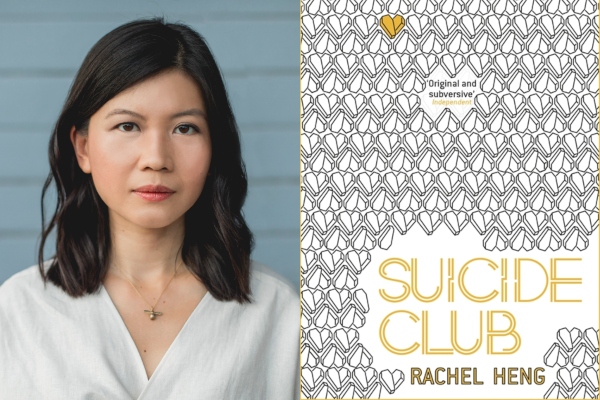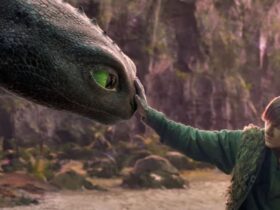The Singaporean author also shares hints about her next book, set in our Lion City!

One of the most original novels of 2018, Suicide Club by Rachel Heng became a huge international hit. It’s a speculative dystopian novel that has been widely acclaimed by many leading magazines and journals, and readers alike, for its creative and thought-provoking premise. Just from the startling title “Suicide Club,” you should brace yourself to enter a world that’s out of the ordinary and about to blow your minds.
In a near-future world of New York, pursuing immortality is the norm and death is illegal. People live for 100 to 300 years, thanks to cutting-edge biomedical technology like DiamondSkin™ and SmartBlood™, but not all get to be “Lifers.” It’s a privileged status determined at birth, and many will do whatever it takes to extend their life: a strict elimination of sugar, meat, alcohol, any exercise that raises adrenaline levels, rock or jazz, books that make you think a lot… Perhaps it’s not that big of a surprise that not everyone desires to lead this kind of life forever. Lea Kirino, a diligent Lifer at a youthful 100 years old and destined for hundreds more, could not understand why someone would choose to die, until she stumbles into the secret network of the Suicide Club. When we are stripped of the right to live as we wish, asserting our right to die becomes a way to seize back our self-control.
Suicide Club is the Singapore-born and raised author‘s debut novel, but you wouldn’t guess it by the gripping, intricately layered and vivid prose. Reading it, we were pulled into the world that, much for its futuristic feel, reflects back enough of our contemporary mentality to make us feel both amused and uneasy. Long after we have put down the novel, we continued to ponder the values of life and death that Heng put forth. We can’t wait to see what’s next from this bright author, and thankfully, we need not wait very long – she’s working on her next novel right now!
In the following interview, Heng tells us more about the ideas behind Suicide Club, drops hints about her next novel, shares writing advice, and more:

Hi Rachel! Before they dive into Suicide Club, what are some things you’d like readers to know about it to set it up for them?
Hi! All you need to know is Suicide Club is a literary dystopian novel, set in a near future world where life expectancy averages 300 years and mankind is on the cusp of achieving immortality.
The novel is satirical in examining the moral good of taking care of our health. What do you think is most problematic about our society’s obsession with wellness?
I don’t think looking good and staying fit in themselves are problematic or harmful things. I’m going to be boring and say it’s a question of moderation and self-awareness. I do think that when it becomes obsessive, competitive or overly tied to a sense of self-worth, it’s more harmful than helpful. I think it’s also indicative of an overwhelming desire to control our own mortality rather than accept it—which is a natural impulse for most of us, and one worth questioning to me.
There’s also quite a lot of dark humour in the novel, like one lifer’s horror towards a diner that doesn’t serve gluten-free food. Was it important to you to inject some humour when tackling dark topics like death and grief?
While death and grief are difficult, I’m not sure they’re necessary ‘dark’ topics, in that they’re inescapably part of life in all its wonder, brevity and strangeness. It’s the same for humour—I think it’s always there, even in what one may think of as the ‘darkest’ situations. One of my favourite writers (and teachers) Elizabeth McCracken says it better than I can: “But good literature has humor in it continuously. Novels that don’t have humor in them are not realistic, and the opposite is also true.”
How different do you think the story and its world would be in you had set your novel in Singapore instead?
I think it would have been difficult for me to write that book. Partly because I would be too close to it to retain the satire, partly because a lot of the book’s questions around healthcare inequality come directly out of encountering the absurdity of the US healthcare system.

Your debut novel is speculative fiction, and so are some of your short stories. What is it that draws you to the genre?
I love speculative fiction that teeters on the edge of reality, in which the world is just slightly askew. I think it offers unique possibilities for allowing us to see ourselves and our world clearly.
Can you share with us about the next novel you are working on?
Alas, not yet! All I can say for now is that instead of being set in the near future, it’s set in the not so distant past, and that it does take place in Singapore.
What advice do you have for yet-to-be-published writers, especially those who also write speculative fiction?
The writer Cory Taylor said this: “Writing, even if most of the time you are only doing it in your head, shapes the world, and makes it bearable.” If you feel the urge to write, to shape your world, then you probably already know the intangible rewards that come with this vocation. Writing nourishes me in a way that nothing else does, and if it does that for you too, then cling to that precious feeling. Cling to it in the times when the words don’t come and the rejection and failure seem overwhelming. It will always get better.
Lastly, what are you reading lately? Do you have any book recommendations?
I recently completed, absolutely loved and highly, highly recommend Namwali Serpell’s novel The Old Drift. It’s an utterly absorbing, genre-busting multi-generational novel set in Zambia, in the vein of Salman Rushdie’s Midnight’s Children and Gabriel Garia Marquez’s One Hundred Years of Solitude. It’s intellectually rich, highly original and also just a rollicking good story to fall into.
A new paperback version of The Suicide Club is now out. Find it in your nearest bookstore today!
ADVERTISEMENTS










Leave a Reply